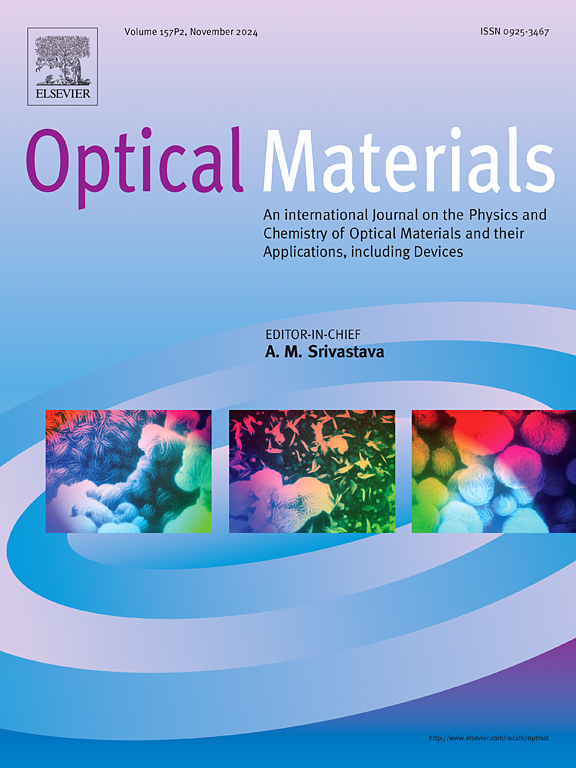在 MEH-PPV/TiO2 纳米复合材料中诱导多色发射
IF 3.8
3区 材料科学
Q2 MATERIALS SCIENCE, MULTIDISCIPLINARY
引用次数: 0
摘要
基于荧光的聚合物应用广泛,如发光二极管、光电子学和生物传感器。本研究致力于探讨 TiO2 纳米粒子(在不同温度下煅烧)对聚[2-甲氧基-5-(2-乙基己氧基)-1, 4-苯基乙烯](MEH-PPV)发射的影响,并诱导多色发射。采用溶胶-凝胶法合成的 TiO2 纳米粒子分别在 400 °C 和 600 °C 煅烧。采用原位聚合法合成了 MEH-PPV/TiO2 纳米复合材料,并利用傅立叶变换红外光谱(FTIR)、X 射线衍射(XRD)、扫描电子显微镜(SEM)和能量色散光谱(EDS)研究了纳米复合材料的结构特征。使用紫外可见光谱、光致发光光谱和荧光显微镜研究了纳米复合材料的光物理特性。在 400 °C 煅烧的二氧化钛纳米颗粒呈现锐钛矿相,而在 700 °C 煅烧的颗粒呈现金红石和锐钛矿的混合相。研究表明,煅烧温度对合成纳米粒子的形态有很大影响。光致发光光谱显示,TiO2 纳米粒子的加入增强了 MEH-PPV 的红橙色发射强度,并在多个波长上发射。荧光显微镜显示 MEH-PPV/TiO2 纳米复合材料发出多种颜色的光。聚合物纳米复合材料中的多重发射源于二氧化钛纳米粒子锐钛矿相和金红石相中存在的氧空位。本文章由计算机程序翻译,如有差异,请以英文原文为准。
Inducing Multicolour emission in MEH-PPV/TiO2 nanocomposites
Fluorescence-based polymers have a wide variety of applications such as light-emitting diodes, optoelectronics, and biosensors. The present study endeavors towards the effect of TiO2 nanoparticles (calcined at various temperature) on the emission of Poly [2-methoxy-5-(2-ethylhexyloxy)-1, 4-phenylenevinylene] (MEH-PPV) and to induce multicolour emission. The TiO2 nanoparticles synthesized by sol-gel method were calcined at 400 °C and 600 °C. In situ polymerization was adopted to synthesize MEH-PPV/TiO2 nanocomposites and the structural characteristics of the nanocomposites were studied using Fourier transformed Infrared Spectroscopy (FTIR), X-ray Diffraction (XRD), Scanning Electron Microscopy (SEM) and Energy Dispersive Spectroscopy (EDS). The photo-physical characteristics of the nanocomposites were investigated using UV–Visible spectroscopy, Photoluminescence spectroscopy, and Fluorescence microscopy. TiO2 nanoparticles calcined at 400 °C demonstrates anatase phase, whereas the particles calcined at 700 °C exhibits mixed phase of rutile and anatase. The study reveal that calcination temperature has a strong impact on the morphology of the synthesized nanoparticles. The photoluminescence spectra reveal that the incorporation of TiO2 nanoparticles enhances the red orange emission intensity of MEH-PPV, additionally exhibits emission at multiple wavelengths. Fluorescence microscopy evidences multiple colour emission from MEH-PPV/TiO2 nanocomposites. The multiple emission in the polymer nanocomposite is arised from the oxygen vacancies present in anatase and rutile phases of TiO2 nanoparticle.
求助全文
通过发布文献求助,成功后即可免费获取论文全文。
去求助
来源期刊

Optical Materials
工程技术-材料科学:综合
CiteScore
6.60
自引率
12.80%
发文量
1265
审稿时长
38 days
期刊介绍:
Optical Materials has an open access mirror journal Optical Materials: X, sharing the same aims and scope, editorial team, submission system and rigorous peer review.
The purpose of Optical Materials is to provide a means of communication and technology transfer between researchers who are interested in materials for potential device applications. The journal publishes original papers and review articles on the design, synthesis, characterisation and applications of optical materials.
OPTICAL MATERIALS focuses on:
• Optical Properties of Material Systems;
• The Materials Aspects of Optical Phenomena;
• The Materials Aspects of Devices and Applications.
Authors can submit separate research elements describing their data to Data in Brief and methods to Methods X.
 求助内容:
求助内容: 应助结果提醒方式:
应助结果提醒方式:


